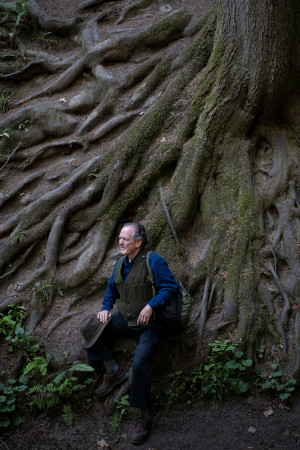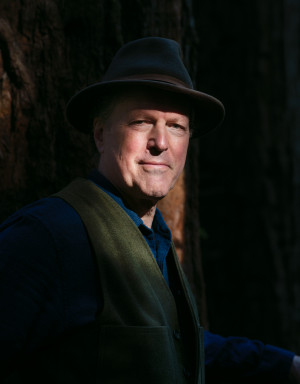The People’s Poet
Associate Professor Kim Stafford, noted writer and teacher, is chosen as Oregon’s ninth poet laureate.

Throughout history, poets have been the voice of the people. Both orally and in writing, they have documented history’s triumphs and defeats, captured legends and myths, and articulated the joys and sorrows of being human. We admire them, we quote them, we puzzle over them—and, like our ancestors, we celebrate them.
In May, Kim Stafford, associate professor and founding director of the Northwest Writing Institute, was named Oregon’s ninth poet laureate.
The author of a dozen books of poetry and prose, Stafford grew up in Oregon, Iowa, Indiana, California, and Alaska, following his parents as they taught and traveled. Stafford’s father, the celebrated poet William Stafford—who was also a professor at Lewis & Clark—served as Oregon’s poet laureate from 1975 to 1990.
“Being the poet laureate of Oregon will allow me to do for communities statewide what I’ve been doing in writing classes at Lewis & Clark for 30 years: inviting people to sit together, abandon reticence, and tell their stories to the page,” says Stafford. “I look forward to advocating for community through poetry in Oregon.” Here’s more from Kim, in his own words (and be sure to check out his poem).
The Primacy of Poetry
¶ I think poetry is our native language. As children, we speak in metaphors, stories, and singsong magic words. To do poetry in adult life is to return to that playful exploration—not just of what language can be but of what life can be.
¶ In my experience, in every community large or small, urban or rural, there are people who are not only receptive to poetry, but desperate for it. They’re hungry. They have been waiting for the kind of connection that poetry provides.
¶ I sometimes find that a poem is presented as if it were an artifact to be admired, a great work of art. And while I can understand that, my own practice is to try to create and present poems that are from me to you—not to be put in a book, displayed on a wall, or memorialized for posterity. Poetry is transactional. It’s like I’m handing you a bowl of food. I’m giving you a spoon of honey.
¶ I think moments of poetry may be embedded in every form of discourse. When you’re listening to a speaker, you may notice a line that rises above … that sings, that thrills. And those lines are poetry. I think of poetry as available to everyone.
The Relevance of Poetry in Today’s Times

¶ The trouble with the news is it’s incomplete. It’s the salt without the pickle. It’s just the skeleton of reporting, and poetry fills out the rest of the story. How do things feel? How do aspirations complement tragedy? How do stories augment facts? I think poetry enables people to have an emotional connection with themselves, each other, and the earth. And without that, we perish. Poetry is a way to restore your buoyancy, your readiness for challenge.
¶ I see writing as the research dimension of an activist’s life. The citizen poem is not necessarily a call to action, but it’s a call to clear thinking, out of which effective action is more likely.
Writing as Connection
¶ Writing can be very lonely and to write with others is like what Fellini said of watching a film: You’re dreaming together. In a recent class, I had a student who did folk dancing with Woody Guthrie. I had another who plays harp in hospice. I had a singer-songwriter. These are forms of inspiration I couldn’t achieve solo. For me, teaching is a selfish act because I write things I value in the company of people I like. We’re engaging in a process that will open doors we didn’t even know we had closed.
¶ Sometimes we’ve been traumatized about writing. We’ve been told that we can’t do it, or we make mistakes, or our writing doesn’t make sense, or it’s not good. How can writing not be good? Language is our greatest treasure as humans. It may be incomplete. It may be unfinished. But part of my work as poet laureate is to say, “Okay, let’s step aside from school-based writing for a moment. Let’s say you’re making a lullaby for your child. You’re writing a love letter to someone dear to you. You’re writing a letter of gratitude. You’re writing a poem as a kind of blessing for something important in your life.” Suddenly the school stuff just falls away. Then we’re back to our native need to bring forth what is within us and give it to another person.
¶ I want to replace divisions with connections. I want to use poetry to escape from the polarizations that our modern life is fraught with and restore connections through poetry. Let’s celebrate the place we live. Let’s celebrate family. Let’s celebrate childhood. Let’s celebrate love and respect as an antidote to the making everything political, which just seems broken to me.
Why not season each day with some magic words?
—Interview by Shelly Meyer
More L&C Magazine Stories
Lewis & Clark Magazine is located in McAfee on the Undergraduate Campus.
MSC: 19
email magazine@lclark.edu
voice 503-768-7970
fax 503-768-7969
The L&C Magazine staff welcomes letters and emails from readers about topics covered in the magazine. Correspondence must include your name and location and may be edited.
Lewis & Clark Magazine
Lewis & Clark
615 S. Palatine Hill Road MSC 19
Portland OR 97219

